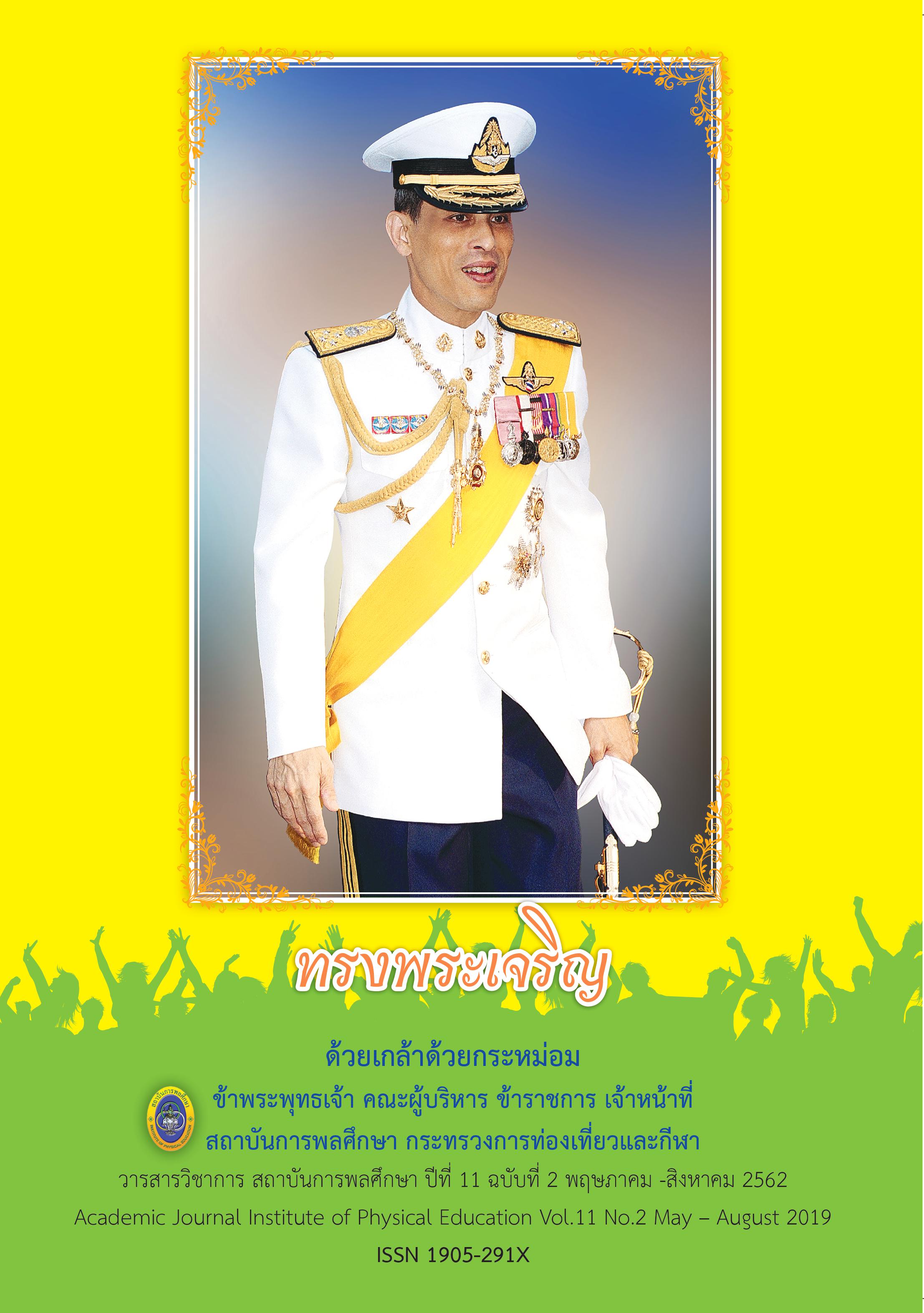THE DEVELOPMENT OF THE QUALITY OF CLASSROOM ACTION RESEARCH EVALUATION MODEL OF TEACHING PRACTICUM STUDENTS, FACULTY OF EDUCATION, INSTITUTE OF PHYSICAL EDUCATION BY PARTICIPATORY ACTION RESEARCH
Main Article Content
Abstract
Classroom action research were a searching process for solutions to the problems while teaching. The study of the condition for development of the quality of classroom action research evaluation model were appropriate. Could be used to a feedback to improve quality classroom action research. It could develop student classroom action research skills. The results of the research can be used to solve problems and develop effective learning in the classroom. The objectives of the research were to: 1) study the state of the quality evaluation for classroom action research of teaching practicum students, Faculty of Education, Institute of Physical Education. The data were collected by questionnaire on state of the research quality in knowledge, concepts and practices. the samples were 991 mentors and supervisors, Faculty of Education in the year 2017 together with related documents, analyzing the quantitative data, content analyzing, and conclusion 2) develop a quality evaluation model for classroom action research of teaching practicum students, Faculty of Education Institute of Physical Education by participatory action research. The model was verified by 17 experts. Using formative and model critical forms as the data collection tools. The data were analyzed by median and interquartile range 3) Evaluate the effectiveness of the developed quality evaluation model by participatory action research. The data were collected by the effectiveness evaluation forms. The implementation group were the supervisors. The data were analyzed by descriptive statistics. The analysis results were;
There were 3 components and 20 indicators of the quality evaluation for classroom action research. For the indicators, they were; the classroom action research process, research operation, and the apply of classroom action research. The evaluation result by experts found that the model was most appropriate and was congruent with the overall criteria. The results of the comparison of knowledge and concept were that the post implementation score were higher than pre implementation score statistically significant at .05 level. For the 4 dimensions an evaluation by Stufflebeam's (2001) theory, it was higher than 3.50 in overall standard, indicating that the model had quality and could be used in the classroom
Article Details
The published article is a copyright of the Academic Journal of Thailand National Sports University. The passage appeared in each article in this academic journal is a perspective of each author which is not related to the journal. Each author is required to be responsible for all components of his/her own article. If there are any mistakes, each author must be responsible for those mistakes on his/her own.
References
ครุรักษ์ ภิรมย์รักษ์. (2544). เรียนรู้และฝึกปฏิบัติการวิจัยในชั้นเรียน. พิมพ์ครั้งที่4. ชลบุรี: ช่างงาม.
พงศ์เทพ จิระโร. (2559). วิจัยปฏิบัติการในชั้นเรียนเน้นปฏิบัติจริงไม่ทิ้งนักเรียน ครูทำได้. กรุงเทพฯ: จุฬาลงกรณ์มหาวิทยาลัย.
รัตนะ บัวสนธ์. (2551). ปรัชญาวิจัย.กรุงเทพฯ: สำนักพิมพ์แห่งจุฬาลงกรณ์มหาวิทยาลัย.
สุพักตร์ พิบูลย์. (2551). กลยุทธ์การวิจัยเพื่อพัฒนางานวิจัยเพื่อพัฒนาองค์กร. พิมพ์ครั้งที่ 4. นนทบุรี: จตุพร ดีไซน์.
สุวัฒนา สุวรรณเขตนิคม. (2543). โครงการประชุมปฏิบัติการนวัตกรรมการเรียนรู้สำหรับครูยุคใหม่. กรุงเทพฯ: ฝ่ายวิชาการและวิจัยคณะครุศาสตร์ จุฬาลงกรณ์มหาวิทยาลัย.
สุวิมล ว่องวาณิช. (2553). การวิจัยปฏิบัติการในชั้นเรียน. พิมพ์ครั้งที่ 14. กรุงเทพฯ: สำนักพิมพ์แห่งจุฬาลงกรณ์มหาวิทยาลัย.
อัจฉรา สระวาสี. (2540 มิถุนายน – กรกฎาคม). “การวิจัยในชั้นเรียนแบบมีส่วนร่วม” วารสาร ข้าราชการครู. 17(5): 15 – 17.
Kemmis, S & McTaggart, R. (1988). The Action Research Planer (3rd ed.).Victoria: Deakin University.
Nevo, D. (1983). The conceptualization of educational evaluation: An analytical review of the literature. Review of Educational Research, 53,117-128.
Scriven, M. (1975). Evaluation bias and its control. Occasional Paper Series No. 4 Western Michigan University, Evaluation Center.
Stufflebeam, D. L. (2000). The methodology of meta-evaluation as reflected in meta-evaluations by the Western Michigan University Evaluation Center. Journal of Evaluation, 22(2), 95-125.
Stufflebeam, D. L. (2001A). Evaluation models. San Francisco: Jossey-Bass


